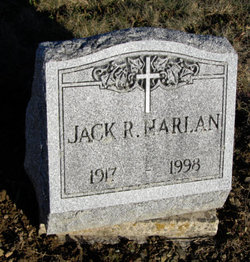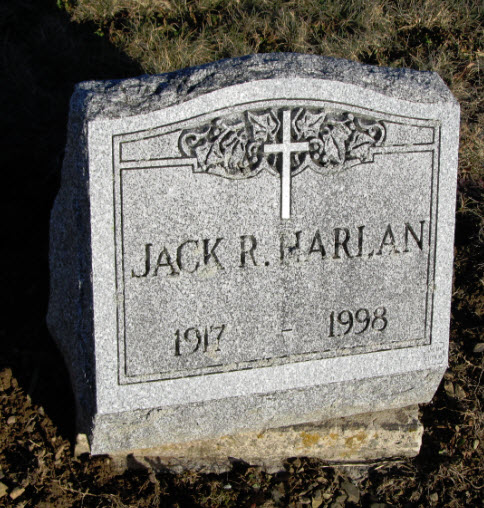Dr. Jack Rodney Harlan, 81, died August 26, 1998, in New Orleans. He was born June 7, 1917, in Washington, DC, to Harry V. and Augusta Griffing Harlan. He earned a B.S. degree, with distinction, from George Washington University in 1938 and a Ph.D. in genetics from the University of California, Berkeley, in 1942. He was the first graduate student of G. Ledyard Stebbins.
On August 4, 1938, he and Jean Yocum were married in Berkeley, CA. They had four children, Sue, Harry, Sherry, and Richard.
Dr. Harlan was greatly influenced in his choice of career by the professional activities of his father. As a child he spent a few years in France where his father, a plant scientist, assisted in the recovery of Europe from World War I. From 1920 to 1944, the senior Dr. Harlan was leader of barley investigations for the USDA in Washington, DC, as well as a plant explorer. During the Sixth International Congress of Genetics that took place in Ithaca, New York, in 1932, teenager Jack Harlan met the great Russian agronomist N.I. Vavilov.
After earning his Ph.D., Dr. Jack Harlan was employed briefly as a research assistant by the Tela Rail Road Company, Honduras. He was a plant geneticist with the USDA at Woodward, OK, from 1942 to 1951; a professor of agronomy at Oklahoma State University from 1951 to 1966; and professor of plant genetics at the University of Illinois from 1966 to 1984. In the U of I Department of Agronomy, he founded the internationally respected Crop Evolution Laboratory which established opportunities for graduate study in such fields as chemical taxonomy, numerical taxonomy, cytotaxonomy, cytogenetics, genetics, archeobotany and ethnobotany of cultivated plants and their relatives. His course lecture notes evolved into the world renowned book, Crops and Man. In 1984, Dr. Harlan retired from the University of Illinois as Professor Emeritus.
Dr. Harlan was a member of Phi Beta Kappa, Phi Kappa Phi, and Sigma Xi. He received many awards and medals in his professional career. His explorations resulted in the introduction of plants from Africa, Asia, and Latin America into the USA. He led plant explorations in many countries including Turkey, Syria, Lebanon, Iraq, Iran, Afghanistan, Pakistan, India, and Ethiopia, and a member of the first team of U.S. agricultural scientists to visit the People's Republic of China. He also participated in several archeological digs.
Dr. Harlan was an excellent speaker with a strong grasp of the English language and a remarkable dry sense of humor. One of his last public lectures at the University of Illinois was entitled, "Lettuce and the Sycamore: Sex and Romance in Ancient Egypt." The title was so intriguing that the lecture attracted a huge audience. Dr. Harlan's contributions encompassed the broad disciplines of agronomy, botany, genetics, anthropology, archeology, history, and more.
Dr. Harlan was interested in music, art, history, sailing, languages, birds, museums, and libraries. He believed that an individual's education should not end with a Ph.D., but rather that it should be a continual process.
-- Information obtained from American Society of Agronomy Crop Science Society of America Soil Science Society of America
Dr. Jack Rodney Harlan, 81, died August 26, 1998, in New Orleans. He was born June 7, 1917, in Washington, DC, to Harry V. and Augusta Griffing Harlan. He earned a B.S. degree, with distinction, from George Washington University in 1938 and a Ph.D. in genetics from the University of California, Berkeley, in 1942. He was the first graduate student of G. Ledyard Stebbins.
On August 4, 1938, he and Jean Yocum were married in Berkeley, CA. They had four children, Sue, Harry, Sherry, and Richard.
Dr. Harlan was greatly influenced in his choice of career by the professional activities of his father. As a child he spent a few years in France where his father, a plant scientist, assisted in the recovery of Europe from World War I. From 1920 to 1944, the senior Dr. Harlan was leader of barley investigations for the USDA in Washington, DC, as well as a plant explorer. During the Sixth International Congress of Genetics that took place in Ithaca, New York, in 1932, teenager Jack Harlan met the great Russian agronomist N.I. Vavilov.
After earning his Ph.D., Dr. Jack Harlan was employed briefly as a research assistant by the Tela Rail Road Company, Honduras. He was a plant geneticist with the USDA at Woodward, OK, from 1942 to 1951; a professor of agronomy at Oklahoma State University from 1951 to 1966; and professor of plant genetics at the University of Illinois from 1966 to 1984. In the U of I Department of Agronomy, he founded the internationally respected Crop Evolution Laboratory which established opportunities for graduate study in such fields as chemical taxonomy, numerical taxonomy, cytotaxonomy, cytogenetics, genetics, archeobotany and ethnobotany of cultivated plants and their relatives. His course lecture notes evolved into the world renowned book, Crops and Man. In 1984, Dr. Harlan retired from the University of Illinois as Professor Emeritus.
Dr. Harlan was a member of Phi Beta Kappa, Phi Kappa Phi, and Sigma Xi. He received many awards and medals in his professional career. His explorations resulted in the introduction of plants from Africa, Asia, and Latin America into the USA. He led plant explorations in many countries including Turkey, Syria, Lebanon, Iraq, Iran, Afghanistan, Pakistan, India, and Ethiopia, and a member of the first team of U.S. agricultural scientists to visit the People's Republic of China. He also participated in several archeological digs.
Dr. Harlan was an excellent speaker with a strong grasp of the English language and a remarkable dry sense of humor. One of his last public lectures at the University of Illinois was entitled, "Lettuce and the Sycamore: Sex and Romance in Ancient Egypt." The title was so intriguing that the lecture attracted a huge audience. Dr. Harlan's contributions encompassed the broad disciplines of agronomy, botany, genetics, anthropology, archeology, history, and more.
Dr. Harlan was interested in music, art, history, sailing, languages, birds, museums, and libraries. He believed that an individual's education should not end with a Ph.D., but rather that it should be a continual process.
-- Information obtained from American Society of Agronomy Crop Science Society of America Soil Science Society of America
Family Members
Sponsored by Ancestry
Advertisement
Advertisement






